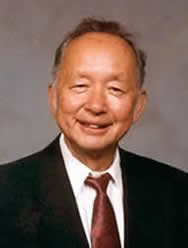

|

|
IN MEMORIAM
Harry H.L. Kitano
Professor of Social Welfare, Emeritus
Los Angeles
1926 – 2002
Professor Emeritus Harry H.L. Kitano, the son of Japanese immigrant parents, was born in San Francisco, California where he spent his childhood until 1942, when, barely into his first year in high school, he and his family were sent to the Topaz “Relocation” Camp in Utah in accordance with Executive Order 9066, which mandated that all persons of Japanese descent be removed from West Coast states and incarcerated in camps in various inland locations. He and his family remained there until 1945. He did not return immediately to California, staying for a time in Minnesota where he played trombone with various jazz bands. He remained a jazz buff from that time forward. After his return he completed his college education, receiving his B.A. from U.C. Berkeley, and then went on to receive his M.S.W. there in 1951 and then his Ph.D. in psychology and education in 1958.
Immediately upon receipt of his Ph.D. he came to UCLA where he remained for the rest of his professional life, having joint faculty appointments in the Departments of Social Welfare and Sociology. Although he retired in 1995, he remained very active in his emeritus status both in the Departments and the broader University. Throughout his tenure, Professor Kitano’s University service was extensive and diverse. He served in the following positions: acting director of the Asian American Study Center in 1971-72 and again in 1988-89; academic affirmative action officer, 1977-82; co-Director of the UCLA Alcohol Research Center, 1979-81; and acting chair of the Department of Social Welfare, 1997-98. Beyond UCLA he was engaged as visiting professor at the University of Hawaii, (1971), International Christian University in Tokyo, Japan, (1972-73), University of Bristol, England, (1979), Whittier College, (1982), and Yamaguchi University, Yamaguchi, Japan, (1992). In 1990, he was appointed as the first incumbent of the Endowed Chair in Japanese American Studies at UCLA, the only academic Chair of its kind in an American University, which was created by Japanese American alumni and friends of the University.
Apart from his academic honors and awards he was the recipient of many others in recognition of his contributions to the broader community including these honors: Nisei of the Biennium and Nikkei of the Year, both by the Japanese American Citizen’s League; and Outstanding Volunteer, Los Angeles County Human Relations Commission. He served on numerous boards and commissions of both governmental and community organizations, including the U.S. Department of Defense’s Equal Opportunity Management Institute Board of Visitors (which he chaired), the Advisory Committee for the Columbia University Minority Leadership Project, the Los Angeles Police Department Advisory Committee, the Skirball Institute of American Values, and the Japanese American National Museum.
Professor Kitano’s scholarship was centered on the application of social science theories and methods to the understanding of patterns of racial and ethnic conflict, cooperation and interactions, particularly as these illuminated the contemporary Japanese American population’s experiences. He authored over 150 books and articles. Among his books, all of which have had multiple editions published over the years, his first, published in 1969, was Japanese Americans: the Evolution of a Subculture, which constituted a pioneering sociological analysis of the Japanese American experience at the time. This was followed by Race Relations, in 1974, of which at the time of his death he was engaged in the preparation of a sixth edition with Professor Diane de Anda. He, along with Roger Daniels and Sandra C. Taylor, co-edited Japanese Americans: From Relocation to Redress. His last book, Achieving the Impossible Dream: How Japanese Americans Achieved Redress, with Mitchell Maki and S. Megan Berthold, detailed the successful efforts to bring about the Congressional passage of the 1988 Civil Liberties American Act which granted redress and a national apology for the incarceration in concentration camps of 120,000 Japanese Americans during World War II. Perhaps as part of the redress of at least one of his own grievances experienced during that period, in 1997 he finally received from the San Francisco Board of Education the high school diploma of which he had been deprived due to his removal from high school because of the 1942 incarceration in Utah. He was the keynote speaker at that ceremony. Numerous other publications by Professor Kitano were based on his research on interracial marriages, juvenile delinquency, mental health and alcohol abuse among Asian Pacific Americans. He was an outstanding teacher and legions of students, as well as younger faculty and scholars, have attested to his excellence as a teacher and benevolence as a mentor.
Professor Kitano is survived by his wife, Lynn, and their daughter Christine; two sons and two daughters by a previous marriage, Keith, Kimberly, Kraig, and Kerrily and a grandson Connor Kitano Hogan; and by his sisters Kiyoko Yamashita, Sadako Kawaguchi, and Chizuko Iiyama and a brother, Tamio Kitano, as well as by numerous nieces and nephews.
Jeanne M Giovannoni